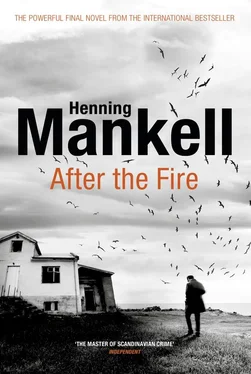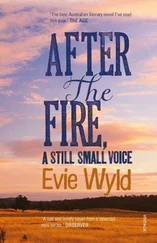‘Shall we go and take a look?’ he said.
Alma Hamrén stayed with the boat; she was composing a text message, her nimble fingers flying.
No one commented on my odd wellington boots. I couldn’t even tell whether they had noticed; surely they must have done?
Smoke was still rising from various spots in the ruins of my house.
‘Do you have any idea how the fire might have started?’ Alexandersson asked.
I explained that there had been no candles burning, and the stove had gone out by the time I went to bed. I had been asleep for less than two hours when I woke to find the whole house ablaze. I also told him that the wiring had been renewed, and that I couldn’t see any logical explanation as to why the fire had broken out.
Lundin remained in the background, listening. He didn’t ask any questions. I realised it was his job to establish the cause of the fire; I hoped he would succeed. I wanted to know what lay behind this disaster.
Alexandersson and Lundin began to walk around among the debris. I kept my distance, observing their slow progress. Occasionally one of them bent down; they reminded me of watchful animals.
I suddenly felt dizzy and had to lean on the old water pump for support. Alexandersson noticed that I wasn’t feeling well and gave me a searching look. I shook my head and went over to the caravan. I sat down on the steps and made an effort to breathe deeply. After a few minutes I stood up; the dizziness had passed. I set off back to the site of the fire, but stopped as I rounded the corner of the caravan and saw the two men standing among the sooty remains of the roof timbers. They were talking; I couldn’t make out what they were saying, but I immediately had the feeling that they were deliberately speaking quietly, as if they didn’t want anyone else to hear.
From time to time Alexandersson glanced in my direction, but I was still hidden by the greenery surrounding the caravan.
I knew, even though I didn’t know. They were discussing the cause of the fire. Saying there were no external factors. Wondering whether I could have started it myself.
I held my breath, trying to make sense of it. Could they really believe that I was capable of such a thing? Or was it just that they had to consider every possibility, no matter how bizarre?
I stayed where I was until they resumed their slow, meticulous examination of the site. From time to time Lundin took photographs.
I pushed aside the low branches and went to rejoin the men.
‘How’s it going?’ I asked.
‘It takes time,’ Alexandersson replied. ‘It’s difficult.’
‘Very difficult,’ Lundin agreed. ‘There’s nothing obvious.’
The young woman called Alma Hamrén was sitting on the bench where I usually examined Jansson when he turned up with his imaginary aches and pains; she was still busy with her phone.
They carried on working for a couple of hours, then said they would probably be back later in the day. I told them I might not be here; I had to go over to the mainland to do some shopping.
I stood on the jetty until the boat had disappeared beyond the headland, then I went back to the remains of the house. They had placed some of the items they had found on a small sheet of plastic.
There were fragments of electrical cables, some half-melted fuses from the fuse box, and at the edge of the sheet I saw something I vaguely recognised. When I bent down to take a closer look, I realised what it was.
It was one of the buckles from the shoes that Giaconelli, the Italian shoemaker, had made for me some years ago.
At that moment I understood that I really had lost everything.
Nothing remained of my seventy-year life.
I stood there gazing at my burned-down house. If I stared at the ruins for long enough, it was as if the building rose again from the sooty ashes.
The site reminded me of a war zone: it could have been the result of exploding grenades, tossed from passing tanks.
I was feeling more and more shaken. The sight of the blackened apple tree filled me with both sorrow and disgust. It was like an attack on the memory of my grandparents. I imagined that it would produce black, putrid apples. No one would be able to eat them. The tree was alive, yet at the same time it was dead.
I moved closer. The ruins were also a burial ground. The whole of my former life had been cremated. During those few violent hours last night the house had been transformed into an oven.
I experienced a vague but growing sense of loss for everything that had gone. I think I was most upset about my logbooks, which is what I called my diaries. The black-covered books hadn’t even crossed my mind as I rushed out of the house, and now they were nothing more than ashes. I could have carried my life in my arms; instead I had fled empty-handed out of the dragon’s mouth.
I thought about Giaconelli’s shoes. The only thing left of them was the charred buckle on Alexandersson’s plastic sheet.
It looked like an insect, perhaps one of the stag beetles I used to see in the summer when I was a child. They had disappeared, although no one seemed to know why. I had once asked Jansson whether there were any among the clumps of oak trees on the islands of the archipelago, and he had asked all the permanent residents when he delivered their post. No one except old widow Sjöberg, who lived in her isolated house on Nässelholmen, had seen a stag beetle since the 1960s. There were plenty around her place, she claimed, but she was notorious for lying about virtually everything, including her own age.
In death Giaconelli’s handmade leather shoes, which he had given me as a present, had been reduced to a charred black stag beetle. I wondered what the buckle was made of. The silver candlestick I had given my grandparents on the occasion of their golden wedding anniversary was gone, the silver now simply part of the remains of the fire.
But the buckle had survived. I wouldn’t be able to ask Giaconelli what material he had used; after many years up in the forests of Hälsingland, where he had set up his shoemaking business surrounded by opera music pouring out of an old transistor radio, he had abruptly returned to Italy.
It seemed he had abandoned his workshop in haste. He didn’t have many friends, and none of them had any idea what had happened. He hadn’t even closed the front door. It had been standing open, banging in the wind, when a neighbour came over to see if the shoemaker could fix the loose sole of one of his work boots.
Giaconelli had completed all his orders before simply getting up from his chair and disappearing.
Later I found out from my daughter Louise that he had gone back to Italy by train, to his home village of Santo Ferrera north of Milan, where he had taken to his bed in a simple boarding house in order to die.
I had no idea what had happened to the workshop, or to his tools and all those lasts in the shape of people’s feet. Louise hadn’t told me, so presumably she didn’t know either.
I picked up the buckle. The last time I had spoken to Louise was two weeks ago. She had called late one night from a noisy cafe on the outskirts of Amsterdam, when I had just fallen asleep. She wouldn’t tell me what she was doing there, even though I asked her twice. The conversation was very brief. She was calling to check that I was still alive, and I in turn asked her if she was all right. Perhaps we regard each other as two patients, carrying out our doctors’ rounds together through a series of telephone calls?
The buckle was a charred memory of a pair of handmade shoes, and of a time when there had been stag beetles on the island. I wondered how Louise would react when she found out that the house that would one day have been hers had burned down.
Читать дальше












